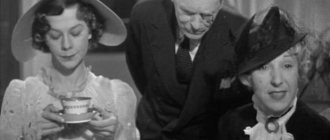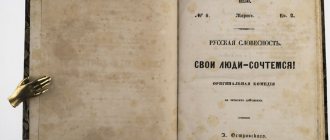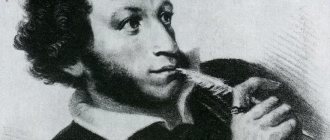- Summary
- Pushkin
- Mozart and Salieri
Salieri recalls his childhood. He loved art from birth. He remembers listening to the church organ. He really liked the sound of it. He even sometimes cried with pleasure. He was not interested in playing with other children. He did not want to teach science. Only music captivated him. It was difficult at first, but Salieri overcame the difficulty. First, the musician learned to play fluently, and then began to create. Sometimes he did not eat or sleep for several days, composing works.
Then he became acquainted with the works of Gluck. Salieri also found inspiration and began to write in a new way. The musician worked hard on his compositions. Finally his works were approved by people. Fame came to the musician. He was infinitely happy. He enjoyed his work and success. His friends also became successful. Salieri liked their works. But the musician had never envied anyone before; now everything has changed. The composer is jealous of Mozart. He is convinced that he is a reveler and does not deserve his talent.
The one he remembered comes to the composer. Mozart brings with him a violinist, he is blind and old. But he still plays the violin. Mozart asks him to play some of his works, the musician finds what is happening funny. But Salieri does not agree with him. He drives away the violinist, who finally drinks Mozart’s health.
At night, inspiration came to Mozart, he shows Salieri what he managed to write. Salieri really likes the work. Friends agree to have lunch together. Mozart goes to tell his wife not to wait for him.
Salieri believes that it is his duty to kill Mozart. He takes out the poison. In the past, he often thought about committing suicide.
During lunch, Mozart sits gloomy. A musician composes a new piece, and it haunts him. A few weeks ago a man dressed in black came to the composer, said one word and left. Now Mozart thinks that this man is stalking him. Salieri tells Mozart that he should not worry about trifles, but rather drink a bottle of champagne.
Then they talk about Beaumarchais, and that there are rumors that the poet mixed poison with someone. Mozart is sure that one person cannot be both talented in any craft and do something as terrible as murder. After this, Salieri pours poison into his friend's glass. Mozart goes to the piano and plays a piece he recently wrote. Mozart goes to bed. Salieri says goodbye to him.
The work teaches that envy is a bad feeling. Unfortunately, it can swallow a person.
You can use this text for a reader's diary
Pushkin. All works
- Arab of Peter the Great
- Peasant young lady
- Bakhchisarai fountain
- Boris Godunov
- Robber brothers
- Shot
- Gavriliada
- Count Nulin
- Undertaker
- House in Kolomna
- Dubrovsky
- Dubrovsky by chapters
- Eugene Onegin
- Evgeny Onegin by chapters
- Groom
- Pugachev's story
- Prisoner of the Caucasus
- Stone Guest
- Captain's daughter
- Kirdjali
- Little tragedies
- Bear
- Bronze Horseman
- Blizzard
- Mozart and Salieri
- Song about Prophetic Oleg
- Queen of Spades
- Queen of Spades by chapter
- Feast in Time of Plague
- Belkin's stories
- Poltava
- Mermaid
- Ruslan and Ludmila
- The Tale of the Golden Cockerel
- The Tale of the Dead Princess and the Seven Knights
- The Tale of the Priest and his Worker Balda
- The Tale of the Fisherman and the Fish
- The Tale of Tsar Saltan
- Stingy Knight
- Stationmaster
- Lukomorye has a green oak
- Gypsies
Summary of “Mozart and Salieri”
Composer Salieri sits in his room. He complains about the injustice of fate. Recalling his childhood years, he says that he was born with a love of high art, that, as a child, he cried involuntary and sweet tears at the sounds of a church organ. Having early rejected children's games and amusements, he selflessly devoted himself to the study of music. Disdaining everything that was alien to her, he overcame the difficulties of his first steps and early adversities. He mastered the craft of a musician to perfection, “to the fingers/Betrayed obedient, dry fluency/And loyalty to the ear.” Having killed the sounds, he dismantled the music, “trusted harmony with algebra.” Only then did he decide to create, to indulge in a creative dream, without thinking about fame. He often destroyed the fruits of many days of labor, born in tears of inspiration, finding them imperfect. But having comprehended music, he abandoned all his knowledge when the great Gluck discovered new secrets of art. And finally, when he reached a high degree in boundless art, glory smiled on him, he found a response to his consonances in the hearts of people. And Salieri peacefully enjoyed his fame, not envying anyone and not knowing this feeling at all. On the contrary, he enjoyed “the labors and successes of his friends.” Salieri believes that no one had the right to call him a “despicable envious person.” Nowadays, Salieri’s soul is oppressed by the consciousness that he envies, painfully, deeply, Mozart. But more bitter than envy is the resentment at the injustice of fate, which gives a sacred gift not to an ascetic as a reward for long and painstaking labors, but to an “idle reveler”; harder than envy is the consciousness that this gift is not given as a reward for selfless love of art, but “illuminates the head of a madman” . Salieri cannot understand this. In despair, he pronounces the name of Mozart, and at that moment Mozart himself appears, to whom it seems that Salieri said his name because he noticed his approach, and he wanted to appear suddenly to treat Salieri with an “unexpected joke.” Walking to Salieri, Mozart heard the sounds of a violin in the tavern and saw a blind violinist playing a famous melody; this seemed interesting to Mozart. He brought this violinist with him and asks him to play something from Mozart. Ruthlessly out of tune, the violinist plays an aria from Don Juan. Mozart laughs merrily, but Salieri is serious and even reproaches Mozart. He doesn’t understand how Mozart can laugh at what seems to him a desecration of high art. Salieri drives the old man away, and Mozart gives him money and asks him to drink to his, Mozart’s, health. It seems to Mozart that Salieri is out of sorts today and is going to come to him another time, but Salieri asks Mozart what he brought him. Mozart makes an excuse, considering his new composition a trifle. He sketched it at night during insomnia, and it is not worth bothering Salieri with it when he is in a bad mood. But Salieri asks Mozart to play this piece. Mozart tries to retell what he felt when he composed and plays. Salieri is at a loss how Mozart could, going to him with this, stop at a tavern and listen to a street musician. He says that Mozart is unworthy of himself, that his work is extraordinary in depth, courage and harmony. He calls Mozart a god who is unaware of his divinity. Embarrassed, Mozart jokes that his deity is hungry. Salieri invites Mozart to dine together at the Golden Lion tavern. Mozart happily agrees, but wants to go home and warn his wife not to expect him for dinner.
Left alone, Salieri says that he is no longer able to resist fate, which has chosen him as its instrument. He believes that he is called upon to stop Mozart, who by his behavior does not raise art, that it will fall again as soon as he disappears. Salieri believes that living Mozart is a threat to art. Mozart in the eyes of Salieri is like a heavenly cherub who flew into the world below in order to arouse wingless desire in people, children of the dust, and therefore it would be wiser if Mozart flies away again, and the sooner the better. Salieri takes out the poison bequeathed to him by his beloved, Izora, a poison that he kept for eighteen years and never resorted to its help, although more than once life seemed unbearable to him. He never used it to deal with an enemy, always prevailing over temptation. Now, Salieri believes, it’s time to use the poison, and the gift of love must go into the cup of friendship.
In a separate room of the tavern, where there is a piano, Salieri and Mozart are sitting. Salieri thinks that Mozart is gloomy, that he is upset about something. Mozart admits that he is worried about the Requiem, which he has been composing for three weeks now at the request of some mysterious stranger. Mozart is haunted by the thought of this man who was in black, it seems to him that he follows him everywhere and even now sits in this room.
Salieri tries to reassure Mozart, saying that all these are childish fears. He remembers his friend Beaumarchais, who advised him to get rid of black thoughts with a bottle of champagne or reading The Marriage of Figaro. Mozart, knowing that Beaumarchais was a friend of Salieri, asks if it is true that he poisoned someone. Salieri replies that Beaumarchais was too funny “for such a craft,” and Mozart, objecting to him, says that Beaumarchais was a genius, like him and Salieri, “and genius and villainy are two incompatible things.” Mozart is convinced that Salieri shares his thoughts. And at that moment Salieri throws poison into Mozart's glass. Mozart raises a toast to the sons of harmony and to the union that binds them. Salieri tries to stop Mozart, but it is too late, he has already drunk the wine. Now Mozart intends to play his Requiem for Salieri. Listening to music, Salieri cries, but these are not tears of repentance, these are tears from the consciousness of duty performed. Mozart feels unwell and leaves the inn. Salieri, left alone, reflects on Mozart’s words about the incompatibility of genius and villainy; As an argument in his favor, he recalls the legend that Bonarotti sacrificed human life to art. But suddenly he is struck by the thought that this is just an invention of a “stupid, senseless crowd.”
Mozart and Salieri
Composer Salieri sits in his room. He complains about the injustice of fate. Recalling his childhood years, he says that he was born with a love of high art, that, as a child, he cried involuntary and sweet tears at the sounds of a church organ. Having early rejected children's games and amusements, he selflessly devoted himself to the study of music. Disdaining everything that was alien to her, he overcame the difficulties of his first steps and early adversities. He mastered the craft of a musician to perfection, “to the fingers/Betrayed obedient, dry fluency/And loyalty to the ear.” Having killed the sounds, he dismantled the music, “trusted harmony with algebra.” Only then did he decide to create, to indulge in a creative dream, without thinking about fame. He often destroyed the fruits of many days of labor, born in tears of inspiration, finding them imperfect. But having comprehended music, he abandoned all his knowledge when the great Gluck discovered new secrets of art. And finally, when he reached a high degree in boundless art, glory smiled on him, he found a response to his consonances in the hearts of people. And Salieri peacefully enjoyed his fame, not envying anyone and not knowing this feeling at all. On the contrary, he enjoyed “the labors and successes of his friends.” Salieri believes that no one had the right to call him a “despicable envious person.” Nowadays, Salieri’s soul is oppressed by the consciousness that he envies, painfully, deeply, Mozart. But more bitter than envy is the resentment at the injustice of fate, which gives a sacred gift not to an ascetic as a reward for long and painstaking labors, but to an “idle reveler”; harder than envy is the consciousness that this gift is not given as a reward for selfless love of art, but “illuminates the head of a madman” . Salieri cannot understand this. In desperation, he pronounces Mozart’s name, and at that moment Mozart himself appears, to whom it seems that Salieri said his name because he noticed his approach, and he wanted to appear suddenly to treat Salieri with an “unexpected joke.” Walking to Salieri, Mozart heard the sounds of a violin in the tavern and saw a blind violinist playing a famous melody; this seemed interesting to Mozart. He brought this violinist with him and asks him to play something from Mozart. Ruthlessly out of tune, the violinist plays an aria from Don Juan. Mozart laughs merrily, but Salieri is serious and even reproaches Mozart. He doesn’t understand how Mozart can laugh at what seems to him a desecration of high art. Salieri drives the old man away, and Mozart gives him money and asks him to drink to his, Mozart’s, health.
Continued after advertisement:
It seems to Mozart that Salieri is not in a good mood today, and is going to come to him another time, but Salieri asks Mozart what he brought him. Mozart makes an excuse, considering his new composition a trifle. He sketched it at night during insomnia, and it is not worth bothering Salieri with it when he is in a bad mood. But Salieri asks Mozart to play this piece. Mozart tries to retell what he felt when he composed and plays. Salieri is at a loss how Mozart could, going to him with this, stop at a tavern and listen to a street musician. He says that Mozart is unworthy of himself, that his work is extraordinary in depth, courage and harmony. He calls Mozart a god who is unaware of his divinity. The embarrassed Mozart jokes that his deity is hungry. Salieri invites Mozart to dine together at the Golden Lion tavern. Mozart happily agrees, but wants to go home and warn his wife not to expect him for dinner.
Left alone, Salieri says that he is no longer able to resist fate, which has chosen him as its instrument. He believes that he is called upon to stop Mozart, who by his behavior does not raise art, that it will fall again as soon as he disappears. Salieri believes that living Mozart is a threat to art. Mozart in the eyes of Salieri is like a heavenly cherub who flew into the world below in order to arouse wingless desire in people, children of the dust, and therefore it would be wiser if Mozart flies away again, and the sooner the better. Salieri takes out the poison bequeathed to him by his beloved, Izora, a poison that he kept for eighteen years and never resorted to its help, although more than once life seemed unbearable to him. He never used it to deal with an enemy, always prevailing over temptation. Now, Salieri believes, it’s time to use the poison, and the gift of love must go into the cup of friendship.
In a separate room of the tavern, where there is a piano, Salieri and Mozart are sitting. Salieri thinks that Mozart is gloomy, that he is upset about something. Mozart admits that he is worried about the Requiem, which he has been composing for three weeks now at the request of some mysterious stranger. Mozart is haunted by the thought of this man who was in black, it seems to him that he follows him everywhere and even now sits in this room.
Briefly exists thanks to advertising:
Salieri tries to reassure Mozart, saying that all these are childish fears. He remembers his friend Beaumarchais, who advised him to get rid of dark thoughts with a bottle of champagne or reading The Marriage of Figaro. Mozart, knowing that Beaumarchais was a friend of Salieri, asks if it is true that he poisoned someone. Salieri replies that Beaumarchais was too funny “for such a craft,” and Mozart, objecting to him, says that Beaumarchais was a genius, like him and Salieri, “and genius and villainy are two incompatible things.” Mozart is convinced that Salieri shares his thoughts. And at that moment Salieri throws poison into Mozart's glass. Mozart raises a toast to the sons of harmony and to the union that binds them. Salieri tries to stop Mozart, but it is too late, he has already drunk the wine. Now Mozart intends to play his Requiem for Salieri. Listening to music, Salieri cries, but these are not tears of repentance, these are tears from the consciousness of duty performed. Mozart feels unwell and leaves the inn. Salieri, left alone, reflects on Mozart’s words about the incompatibility of genius and villainy; as an argument in his favor, he recalls the legend that Bonarotti sacrificed human life to art. But suddenly he is struck by the thought that this is just an invention of a “stupid, senseless crowd.”
First scene
A. S. Pushkin’s “little tragedy” “Mozart and Salieri” begins with Salieri indulging in thoughts about his childhood, sitting in a room alone. He recalls how his creative journey into the world of music began and says that from an early age he admired the church organ. The hero began to grow up early and became aware of his passion for music, as a result of which he abandoned “idle amusements” and was indifferent to crafts and sciences.
Thus, the composer gradually mastered some skill in his craft. Then he began to dream of creative greatness, but did not think about fame. The musician worked diligently, for days on end, “forgetting both sleep and food,” after which he burned unsuccessful works and watched as they “disappeared, blazing, with light smoke.”
Fame did come to Salieri. The musician sincerely enjoyed not only his success, but also the success of his colleagues. “I have never known envy,” the composer says openly. But, according to him, everything changed when the genius Mozart appeared in his life, and hard work faded into the background. It was then that Salieri learned what “painful envy” means. The confession ends with the musician shouting out Mozart’s name, and he comes to his call.
Mozart wants to introduce to his friend the old violinist who made the composer laugh with his performance of an aria from Don Giovanni. The guest regards the violinist’s dubious skill with a grin, but Salieri is negatively disposed towards this kind of art and is indignant at his friend’s reaction. He drives the old man away.
However, Mozart has more news for Salieri, and he decides to show him several of his creations, which he created from insomnia. The musician was amazed by his colleague’s compositions and calls him “god.” The author does not see anything “divine” in his works and is distracted by the desire to have a snack.
Salieri invites a friend to have lunch at the Golden Lion tavern. Mozart leaves to warn his wife of his absence.
Left alone, the composer begins to think again, but now about his mission to stop a colleague from whom he does not expect any benefit for the music. The hero thinks that Mozart should not continue to create musical masterpieces that no one can outgrow, because because of this art will die, since it will not be able to develop.
Salieri has poison that his beloved Izora left for him. The composer was unable to poison himself, although he had been reaching for the flask for many years. He continued to hope that one day "the world will bring sudden gifts" and he will be "visited by delight", or he will meet his "worst enemy" and poison him with Izora's gift. Salieri decides that the poison will cause the death of the enemy. This ends the first scene.




